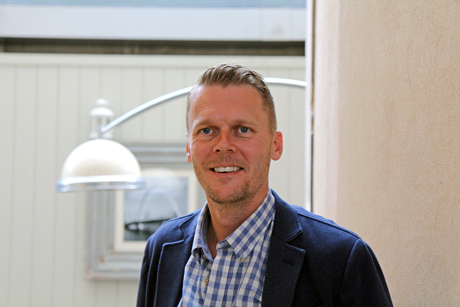
A new social enterprise is helping ex-offenders turn their lives around by employing them to build and refurbish homes. Project Scotland finds out more.
SOMETIMES the best ideas are also the simplest. For Barry Mochan, Glasgow Together, a new social enterprise that aims to rehabilitate ex-offenders through construction skills training and onsite experience, is the concept he always dreamed of creating.
A former policeman and property developer, Barry has worked in the construction industry since his teenage years helping his dad onsite during the summer holidays. After nine years in the police force, renovating and reselling properties on his days off, Barry moved into project management fulltime before joining Glasgow Housing Association in search of a more ‘socially worthwhile’ career.
With Midlands Together and Bristol Together already successfully established, Barry, who is now CEO of Glasgow Together, says that although the initial idea wasn’t his, he couldn’t imagine a job more suited to his experiences or more enjoyable than his current role.
“I got a bit frustrated in the police in that I was continually putting the same people in jail for the same crime,” he said.
“They’d disappear for three or four years, come back out and I’d arrest them again for literally the same thing.
“I worked as a specialist interviewer for a while so eventually you get to build a rapport with people. The question I would always ask was, ‘Why do you do this? You know you’re going to get caught’ and their response would invariably be, ‘What else am I supposed to do?’
“This is a chance to change that cycle.”
Glasgow Together will offer 50 ex-offenders and 50 offenders currently in prison the chance to gain qualifications, hands on experience and employment references in the construction industry.
The offenders in Barlinnie prison will receive specialist training in modern construction skills in state-of-the-art, in-house workshops and will build pre-fab structures that will then be assembled by the ex-offenders employed onsite.
Together with a team of specialist trainers, social partners and construction contractors, Barry will source plots and properties for purchase and development before selling the lots on with all profits reinvested in the enterprise.
“These guys are part of something that isn’t a charity. It’s not a handout. It’s a profit making enterprise with all profits reinvested in the scheme,” Barry explained.
“You want to show that initiatives like this can stand on their own two feet without being reliant on grants and government funding.
“It’s self-sustaining and it also gives us a lot of flexibility in that we’re only bound by the same regulations as any other property developer, but we get to deliver an amazing social benefit.”
Whilst Glasgow Together is foremost for the rehabilitation of the offenders and ex-offenders involved, in bringing affordable, new build housing to socially deprived areas, the programme could have a wider effect on the city’s crime rate.
“I saw it from my time in the police that essentially only one or two pence from the pound was put back into the properties and the rest was used to service debt.
“The properties were abysmal. But I started to notice that in the areas that were getting investment, the crime rate was dropping. There was a definite correlation between the two. Better housing does make a difference.
“You can lift that area up, there’s no two ways about.”
Operating on a five-year bond issue, with investment of £2 million secured through funding efforts from Triodos Bank, an ethical financer that only works with organisations it deems socially or culturally beneficial, Glasgow Together will operate for five years initially before the bond is renewed and the programme further expanded if the initiative succeeds.
Midlands Together, which was established in 2013, has so far achieved a 0% reoffending rate amongst the trainees participating, an impressive feat considering the national average for short-term reoffending is 60%.
With around 11% of the Scottish population living in Glasgow and a disproportionally high rate of criminal activity in the city, replicating the success of previous Together initiatives in Glasgow could be transformational for the police, public and ex-offenders alike.
A staggering 30.7% of ex-offenders released from prison in Glasgow re-convict within a year and almost a quarter of the Glasgow population report being the victim of a crime each year, 8% above the national average of 16%.
“There is a huge need for this in Glasgow,” said Barry.
“There’s a massive rate of reoffending and there’s things that need done. Glasgow, to be honest, is tailor-made for it. It’s fertile ground; we’ll see an impact and £2 million can get you a lot of reasonable sized projects in Glasgow.
“You can imagine the size of the bond issue you’d need to work in London. We’ve got members on the board from down South in the Together Group and I think they see that there’s a much more positive mindset in general up here as well.
“Some people might have the ‘lock them up and throw away the key’ mentality, the reality is though that isn’t what happens in this country, people come out the other end.
“So do they come out the other end, do the same thing and go back in again? Or do we try and prevent that by giving them something worthwhile and the possibility of a second chance?
“Our aim is to give people the experience, the work ethic if they didn’t already have it, and quite importantly, to give people the reference. From there people can move on into self-employment or into larger construction companies.”
With only 100 places available in total, Barry says he is both enthused and slightly apprehensive by the overwhelming response Glasgow Together has so far had from offenders, ex-offenders and the prison services.
Enthused by the support and amount of people wanting to get involved, contribute and be part of the programme; apprehensive about the reality that with limited places available, the competition for selection will invariably leave some offenders and ex-offenders disappointed.
Yet, seeing how the enterprise can progress, and that there is both a huge demand and an evident need for Glasgow Together, is surely further encouragement to make the first programme that much of a success that more funding for a bigger enterprise is secured in five years time.
“From my perspective, I would like to develop it in Glasgow to such an extent that if we go to bond issue again it’s on a much bigger scale and we can help more people,” continued Barry.
“The response has been just incredible. The only problem I’m really going to have this time is that there are too many people for each place.
“We aim to recruit through social partners. You’ll find that there are people with Community Payback Orders that will come to the end of their order and want to volunteer.
“People who have the infrastructure of work and enjoy teamwork and there’s a bank of those people throughout Glasgow. They’re exactly the sort of people we want to give work experience.
“The main thing for me is the motivation to work and to change.
“I would rather take somebody who is motivated to be on the programme and to learn, than somebody who was a bricklayer for 20 years before they went to prison but isn’t particularly interested now.
“Speaking to prisoners in Barlinnie, one of the guys that really impressed me said, ‘If you give people like us a chance, what you’ll get from us is loyalty.’”
Whilst Barlinnie is currently equipped with modern, spacious workshops for prisoners to assemble garden benches and planters, Glasgow Together will see the spaces further expanded, with offenders and ex-offenders working on high-end renovations, new build developments and smaller scale refurbishment projects.
So why did the Together Group decide that offender rehabilitation would work best within the construction industry?
“With construction you always seem to be judged more on your conduct onsite rather than what you might have done in the past,” said Barry. It’s an environment where you’re going to be accepted as long as you put a shift in. A lot of these guys see construction as a respectable occupation. To be the guy who knows how to build a house, a lot of people aspire to that.”
“I’ve dealt with the young offenders institute in Polmont and I’ve dealt with Barlinnie prison as well.
Both of them are phenomenally progressive. They really recognise what’s needed here and they’ve bent over backwards to meet and assist with Glasgow Together. It’s been pushing against an open door. It genuinely has. That’s the thing that I really like about this. There’s no cynicism, there’s no downsides, nobody’s got any ulterior motives. They just want to do it.”









